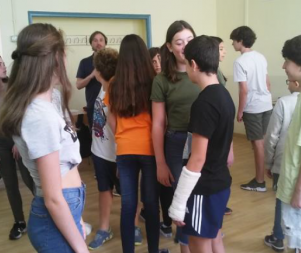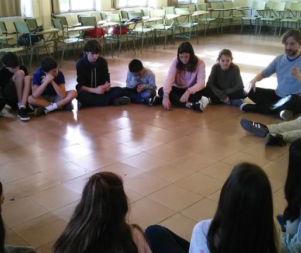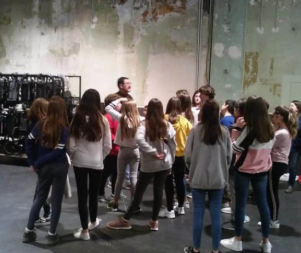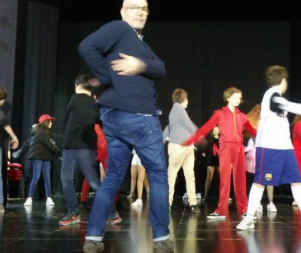- 14th EDITION 2022 / 2023
- 13th EDITION 2021 / 2022
- 12th EDITION 2020 / 2021
- 11th EDITION 2019 / 2020
- 10th EDITION 2018 / 2019
- 9th EDITION 2017 / 2018
- 8th EDITION 2016 / 2017
- 7th EDITION 2015 / 2016
- 6th EDITION 2014 / 2015
- 5th EDITION 2013 / 2014
- 4th EDITION 2012 / 2013
- 3rd EDITION 2011 / 2012
- 2nd EDITION 2010 / 2011
- 1st EDITION 2009 / 2010
Pau Miró IN RESiDENCE at the School Moisès Broggi
From the start of the project, playwright, director and actor Pau Miró wanted to share with students the process of creating a play. This was about getting them involved in the decision-making process so they could experience the whole process first hand. In addition, Pau Miró decided that, throughout the process, he would treat these teenagers like the actors he was used to working with, sharing with them at all times any doubts, uncertainties and impressions.
The first term, from October to February, was a period of discovery and trial and error. On the one hand, Pau Miró introduced himself and explained the work he was doing, talking about what he had done up to then and showing excerpts of some of the shows he had staged and some of the television series he had taken part in as a script writer. In addition, the teacher David Arnaiz made the most of the third hour and held a group reading of a play by Pau where teenagers were the central characters: els Búfals. That helped them to familiarise themselves somewhat with Pau's writing and get on with him better.
On the other hand, he proposed a range of exercises for them which could be classed as performance exercises (for creating group synergies, promoting concentration and silence — very much needed!—, getting over embarrassment, experiencing for themselves what acting meant...) and writing exercises (for imagining stories, practising dialogue, choosing issues that interested them and so on). Ultimately, the exercises in this second group were aimed not just at getting the students to immerse themselves in the world of dramatic writing but also at giving Pau an opportunity to find out in greater detail what interested, attracted or put off young people of this age when it came to producing the play that would have to be presented at the end of the work process, which Pau wanted to be based on the experiences, thoughts, fears and hopes of the students themselves.
Once the Christmas holidays were over, it was time to start defining the project. As I mentioned before, Pau wanted the play to be about the young people and what they felt and generally didn’t talk about, which is why he started to use the exercises they had written during the first term (without it having crossed the students’ mind that they could end up having any dramatic purpose) and proposed others. So, they had to answer questionnaires in one-off sessions where, in the middle of a host of rather insignificant questions, they had been asked more personal things, such as what they liked most and what they could not stand, a childhood song they had good memories of and so on. On the other hand, one day, after a girl's confession of a time when she had been very scared, cases started to come to light where the girls in the class in particular had been very scared and felt threatened. It was a day in which a magical atmosphere was created, in which (finally!) silence was imposed and a long series of confessions of times like this captivated us all. It was then clear to Pau that the show had to be based on the personal experiences of the students and had to provide an opportunity for them to freely express themselves and be listened to.
The text Pau wrote for presenting the show made it quite clear:
“The main act of resistance is freedom of expression. And that is what we have tried to do throughout this year, to get the students to express themselves freely, to speak about what worries them and what fascinates them. About what angers them and the little things that fill them with joy. Acts of resistance which are fragments of themselves, of their take on reality and of the fantastic excursions they have made through fiction. And all that for gaining awareness of themselves, learning how to narrate themselves. In case the world should swallow them up without asking them questions!”
The process was not easy. The students expected to take part in creating a rather more traditional play (with a fictitious story and a plot, development and denouement). Pau changed their expectations and suggested they should write and star in a semi-documentary, which talked about them and their own experiences, without a linear narration. This caused some reticence (and resistance) from the students at the very start , as they did not understand how that could be turned into theatrical material. It was not until they were able to see it, until they started to move around the stage, rehearsing, reciting the text, singing, under Pau's direction, that they began to accept that talking about themselves could be more interesting, fun and exciting than inventing themselves as characters they had little in common with.
In the last two months (basically, April and May), once Pau had more or less written and structured the play, he began to stage it with the students. The performers gradually started to become aware of the difficulties that acting involved: learning the text, acting naturally, repeating a scene again and again, projecting their voices and so on. Each session involved working on two or three new scenes which built on the foundations of the ones already worked on, while they made the most of the third hour for revisiting scenes already rehearsed, going over the text, practising what had not come up and adding small changes to the text. The show gradually started taking shape.
RESIDENCE-RELATED INITIATIVES
Various activities were organised during the residence involving various theatres and institutions:
- 17 December 2018: guided tour of the Sala Beckett to learn about the various spaces and elements involved in the creation process of a show.
- 1 March 2019: the director and choreographer Joan Maria Segura came to add some finishing touches to the students’ choreographies and movements.
- 4 April 2019: attendance at a matinee performance of Cristina Clemente’s play Andrea pixelada, at the Sala Beckett.




